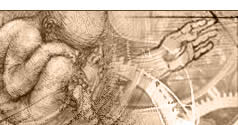| 65 |
Paradigm of evolution
|
| |
Modern science conducts its research within the paradigm of evolution (macroevolutionary, primordial soup and big bang theory), the basic tenets of which cannot be proved.
|
| 66 |
Naturalistic world view
|
| |
Since it is impossible to determine precisely the point at which natural phenomena stop and supernatural phenomena begin, it is not possible to explain the world on naturalistic termes only.
|
| 67 |
Dogma of Evolution Theory
|
| |
The origin of the theory of evolution is of a philosophical nature (enlightenment, rationalism, naturalism) and a religious dogma with a scientific varnish.
|
| 68 |
Evolutionary psychology
|
| |
Many of the conclusions of evolutionary psychology prove to be circular arguments, or are formulated in a very vague and undifferentiated way, so that they can be considered as merely plausible-sounding stories that can be neither confirmed nor denied.
|
| 69 |
Chance Processes
|
| |
The rationale offered for macroevolution, with a combination of the factors accidental mutation and necessary selection, is without substance in the result due to the element of chance involved, i.e. it makes no logical assertions.
|
| 70 |
Causal evolutionary research
|
| |
Causal evolutionary research cannot possibly explain an incalculable and unforeseeable development, which according to its own theory is based on pure accident.
|
| 71 |
Homologous organs
|
| |
Similarities (homologous organs) do not proof a common descent, all they demonstrate is that the same basic principles have been applied in different organisms.
|
| 72 |
Natural perfection
|
| |
The observation that, left to itself, nature knows no incomplete ecosystems, and that most organisms contribute to the welfare of the entire ecosystem, is incompatible with the notion of accidental development.
|
| 73 |
Teleology and orderliness
|
| |
The proposition that all the innumerable cosmic and biological structures have arisen by chance contradicts the obviously teleological and planned character of the entire natural world.
|
| 74 |
Purpose of Life
|
| |
The theory of evolution cannot answer the question as to the ultimate meaning of life.
|
| 75 |
Unnecessary Beauty
|
| |
The purposeless beauty seen in nature cannot be explained by the naturalistic approach.
|

